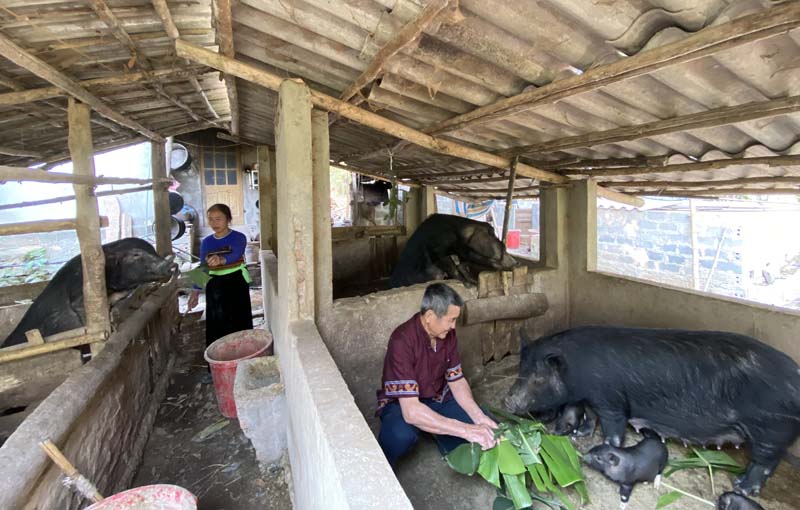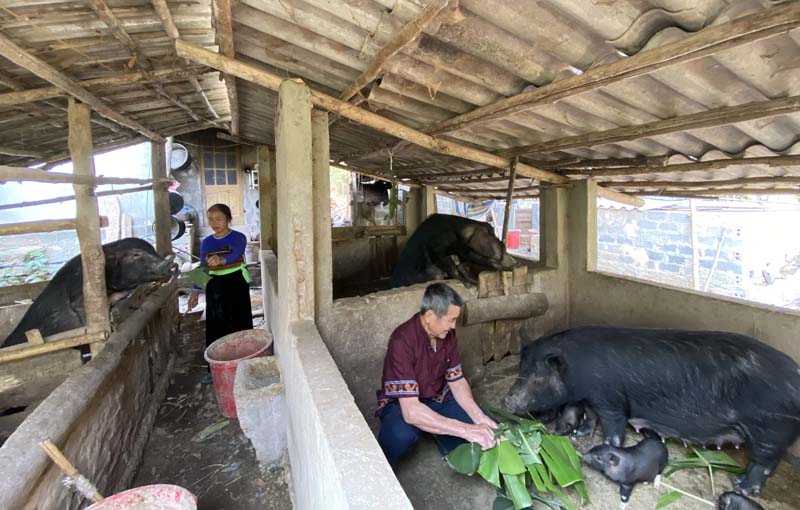
(HBO) - Despite raising black pig (an indigenous variety) for long, it’s only when joining the Muong Pa local pig breeding cooperative did member households in Xam Khoe and Bao La communes in Mai Chau district have chances to gain access to the commodity economy.
 Member households of Muong Pa indigenous pig breeding
cooperative in Xam Khoe commune (Mai Chau district) ensure a sufficient source
of piglets to reduce production costs and increase income.
Member households of Muong Pa indigenous pig breeding
cooperative in Xam Khoe commune (Mai Chau district) ensure a sufficient source
of piglets to reduce production costs and increase income.
Indigenous pigs are favoured by consumers thanks
to its delicious meat. To have high-quality products, the quality of piglets is
a decisive factor. Member households know that to participate in the commodity
economy, they have to take the initiative in the supply of piglets and feed.
Specifically, the supply of piglets is ensured by cooperative members by keeping
sows, while the main feed for pigs includes "rau duong” (Diplazium esculentum),
sweet potato, taro, colocasia gigantean and banana trunk, which are planted in
a large scale of thousands of square metres. Mash for pigs and veterinary medicine
are provided by the cooperative.
Member households are equipped with technical
guidance and knowhows to prevent diseases, therefore, the quality of pork is
ensured.
According to statistics, the cooperative is
raising a herd of 120-150 hogs and 20 sows. With active supply of piglets and
foodstuff and common breeding methods, member households can enjoy 65-70
percent in profits. In addition to connecting with a mash production company,
the cooperative has supported member households in seeking consumption markets.
Specially, through the help of the GNI in Vietnam, the cooperative has recently
put into operation a slaughterhouse which comprises of areas for breeding,
slaughter, semi-processing and waste treatment with a designed capacity of 20
hogs a day.
With the application of on-spot production,
semi-processing and food safety measures, Muong Pa cooperative eyes bigger and
more stable markets. The cooperative’s director said that it is striving to
have more members to develop further, thus contributing to helping indigenous pig
raising households access potential markets and gain stable livelihoods./.
According to data from the Hoa Binh Provincial Party Committee, the industrial production index for the first six months of 2025 is estimated to have increased by 20% compared to the same period last year. This marks the highest year-on-year growth rate for this period since 2020.
In the first six months of 2025, Hoa Binh province’s export turnover was estimated at 1.145 billion USD, marking an 18.11% increase compared to the same period in 2024. Import turnover was estimated at $ 804 million, a 17.15% increase, which helped the province maintain a positive trade balance.
The lives of the ethnic minority farmers in Tan Lac district have gradually improved thanks to the new directions in agricultural production. This is a testament to the collective strength fostered through the professional associations and groups implemented by various levels of the district’s Farmers’ Union.
With the motto the "product quality comes first,” after nearly one year of establishment and operation, Muong village’s Clean Food Agricultural and Commercial Cooperative, located in Cau Hamlet, Hung Son Commune (Kim Boi district), has launched reputable, high-quality agricultural products to the market that are well-received by consumers. The products such as Muong village’s pork sausage, salt-cured chicken, and salt-cured pork hocks have gradually carved out a place in the market and they are on the path to obtaining the OCOP certification.
In the past, the phrase "bumper harvest, rock-bottom prices" was a familiar refrain for Vietnamese farmers engaged in fragmented, small-scale agriculture. But today, a new spirit is emerging across rural areas of Hoa Binh province - one of collaboration, organisation, and collective economic models that provide a stable foundation for production.
Maintaining growing area codes and packing facility codes in accordance with regulations is a mandatory requirement for agricultural products to be eligible for export. Recently, the Department of Agriculture and Environment of Hoa Binh province has intensified technical supervision of designated farming areas and packing facilities to safeguard the "green passport" that enables its products to access international markets.



 Member households of Muong Pa indigenous pig breeding
cooperative in Xam Khoe commune (Mai Chau district) ensure a sufficient source
of piglets to reduce production costs and increase income.
Member households of Muong Pa indigenous pig breeding
cooperative in Xam Khoe commune (Mai Chau district) ensure a sufficient source
of piglets to reduce production costs and increase income.